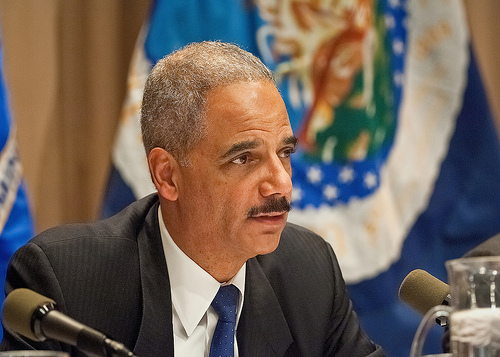Cause of Action submitted a statement for the record as part of a Congressional hearing on March 21, 2012 on FOIA technology. In an effort to educate the public and Congress on CoA’s experiences with FOIA requests and the problems with the current system of filing and receiving responses through the federal government, CoA offered the following statement: CoA Statement for the Record 3 19 2012
Cause of Action to DOJ: Are Taxpayer Dollars Being Used to Lobby for Taxes and Legislation?

In a letter to the Department of Justice submitted on March 16, 2012, Cause of Action requests an investigation into a grant program through the CDC called Communities Putting Prevention to Work (CPPW) aimed at anti-tobacco and anti-obesity initiatives. Cause of Action investigators uncovered multiple instances where these grants may have actually been used for lobbying on tobacco and obesity legislation.
In October, 2011, CoA sent a letter to the Inspector General at the Department of Health & Human Services (HHS) requesting an investigation into the CPPW program. In February, CoA sent letters to 20 grant recipients citing potential violations of lobbying laws based on their reports of how the CPPW grant monies were either being used or were to be used. Since HHS has failed to respond to CoA’s request for investigation, we submitted a letter to the DOJ asking them to look into how these taxpayer dollars are actually being used.
See the letter here.
CoA Holds Dept. of Energy Accountable for Ignoring Procedure
Cause of Action, on behalf of Heating, Air-conditioning, and Refrigeration Distributors International (HARDI) filed a petition to intervene in a lawsuit against the Department of Energy for refusing to follow protocol and breaking procedure. The Department of Energy issued a rule that will drive up costs for distributors, installers, and consumers of heating and air conditioning products across the United States. Refusing to acknowledge properly filed comments and concerns from HARDI, the Department of Energy issued new energy efficiency standards set to go into effect May 2013. Cause of Action took up HARDI’s case in the U.S. Court of Appeals to hold the Department of Energy accountable for ignoring procedure and inflicting job-killing regulation on the heating and air industry.
See the filed petition here and the full press release here.
(Image source: Flickr user OversightandReform)
CoA Stands Up Against Government Regulation of Private Choices
Cause of Action has just filed a brief before the FDA on behalf of Trent Arsenault, a Bay Area man who has been ordered by the federal government to “cease manufacture” of sperm. Over the last six years, Mr. Arsenault has helped thirteen couples conceive by donating his gametes to them at no cost. Many of these couples would otherwise have been forced to spend tens of thousands of dollars at a sperm bank without any guarantee of results. Trent does not take any compensation for his services and donates simply out of his desire to help those in his community having trouble conceiving.
Despite this, the FDA last year classified Trent as a “firm” which is a “manufacturer of human cells, tissues, and cellular and tissue-based products.” As such, the FDA ordered Trent to cease “manufacture” of his gametes unless he complies with regulations that normally apply to sperm banks. Compliance with these regulations would cost tens of thousands of dollars and be practically impossible for Mr. Arsenault as he does not own, nor operate out of, a laboratory. Trent has asked for an opportunity to tell his side of the story at a hearing, but the government opposed his request.
Cause of Action has decided to represent Mr. Arsenault because we are outraged at the intrusion of the FDA into the private lives of Trent and the people he helps. The FDA admits that if Mr. Arsenault was a “sexually intimate partner” with the couples that he helps that he would be beyond their regulation, but they offer no definition of what that term means. The FDA should not be in the business of deciding who is, and is not, sexually intimate, especially when doing so interferes with private individuals’ ability to start a family.
CoA Files Amicus Curiae Brief in EPA Case
Asks Court to Extend EPA Rule-Making Deadline for MACT Utility Rule
Cause of Action, along with the Institute for Liberty and the Center for Rule of Law, filed a motion in Federal Court supporting the Utility Air Regulatory Group's motion to modify an EPA rulemaking timeline. Specifically, CoA seeks to participate in the EPA's “Utility MACT” rulemaking to bring to the Agency's attention recently released materials that cast doubt on its fundamental assumptions concerning Utility MACT's impact on reliable electric service a
nd, those assumptions being no longer reliable, the complete absence of data or information supporting the Agency's approach of ignoring reliability. Particularly, EPA assumes that its Proposed Rule would not impair reliability and ended its analysis there. Yet a detailed preliminary assessment undertaken by the Office of Electric Reliability of the Federal Energy Regulatory Commission demonstrates that Utility MACT is likely to cause far greater retirements of generating capacity than projected by EPA and pulls the legs out from under EPA's assumption of continued reliability.
According to a consent decree entered in this case, the EPA currently has until November 16, 2011 to promulgate final emissions standards, not nearly enough time to consider the new evidence the groups have brought forth. Thus, CoA and the other groups asked the court to extend that deadline in order for the EPA to take into account the new studies.
Image courtesy of Flickr user benchilada.
CoA to National Mediation Board: Tell Us Who You Talked To
Cause of Action sent a Freedom of Information Act Request to the National Mediation Board asking for documents related to various labor unions’ involvement in recent Board rulemaking. Specifically, CoA is concerned by the National Mediation Board’s recent decision to advance a rule which allows only a small minority of all eligible employees to determine union representation. For over 75 years, the Board conducted union representation elections according to the principle that a union would be certified as the collective bargaining representative only if a majority of the eligible employees in the relevant craft or class voted in favor of union representation. This “Majority Rule” is stated directly in the text of the Railway Labor Act, which provides that “[t]he majority of any craft or class of employees shall have the right to determine who shall be the representative of the craft or class for the purposes of this chapter. On May 11, 2010, the NMB issued a final rule, effective June 10, 2010, allowing a union to be certified as a firm’s collective bargaining representative based on a majority of votes cast, therefore abandoning the Majority Rule in favor of a Minority Rule.
CoA is particularly troubled by evidence tending to show that this change in the rule was the result of a predetermined effort to advance a partisan policy agenda.
Photo courtesy of Flickr user atache.


